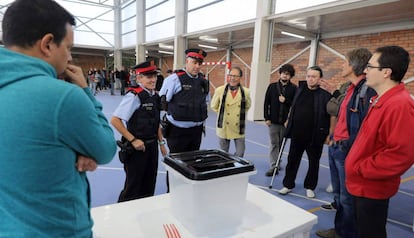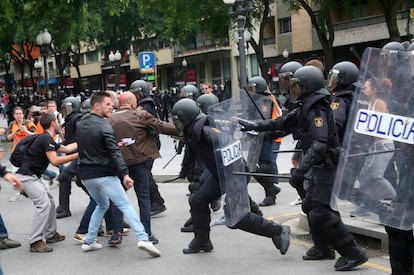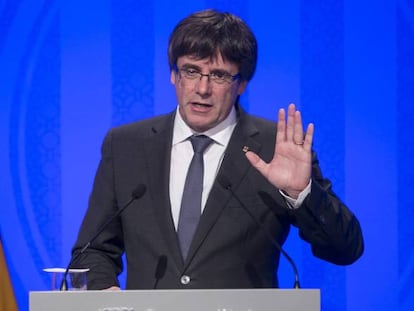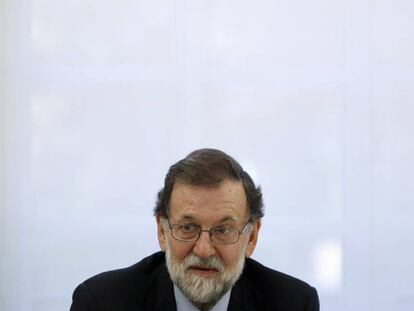How the independence referendum has split the Catalan police force
Recent operations have divided Mossos and called into question relations with other forces and judiciary

The Catalan regional police, the Mossos d’Esquadra, are a force divided after events in recent weeks that culminated in their role in Sunday’s illegal independence referendum in Catalonia, where they have been accused of failing to carry out their orders and prevent people casting their ballots in a vote declared illegal by Madrid and banned by Spain’s Constitutional Court.
Some officers feel they have been used by their chief, Josep Lluís Trapero, who is currently being investigated by Spain’s High Court for sedition over his role in a protest in Barcelona on September 20 when Civil Guard patrol cars were vandalized. Some accuse Trapero of having betrayed them. Others admire him for his strategy of not allowing the Mossos to come into conflict with the citizenry at any cost and feel proud of being “the police of the people.”
The division is so deep that unions for the regional force have avoided making statements on the subject of Trapero, knowing that, whatever they do, half of their members will either be offended or could even walk off the job.
It appears the force have forgotten from one day to the next that they are judicial police Judge in Catalonia
The Catalan regional police have played a central role in recent events in Catalonia and it has affected the force deeply. “There is the sad feeling that the Mossos are going to be the first to fall,” one police source says. Six courts across Catalonia are currently investigating whether the regional force deliberately failed to carry out orders from the Catalan High Court (TSJC) to prevent the referendum from taking place. The TSJC itself has also demanded explanations over the force’s actions on October 1.
On the day of the referendum, operational plans specified that uniformed Mossos d’Esquadra patrols would identity vote organizers and close polling stations, where dozens of people were expected to be gathered. However, some officers found themselves in situ for 14 hours without being able to intervene. “Even the organizers knew nothing would happen,” an officer who called for support from riot police on the day of the referendum explains. But orders from Trapero were clear: no physical force as to be used unless a police officer or a third party was injured. “We are on the road to ruin,” the officer says.
Other officers with the Catalan force did not even enter the polling stations on October 1. “I suppose no one here is responsible, right?” one officer can be heard asking in a video. Everyone there said “no” and the officer simply moved on, saying it was “impossible to enter.” Onlookers applauded as the police officer smiled.

“Those images are crushing us,” one high-ranking officer says.
“People should respect us, in the same way we should respect them, but not applaud,” says another Mossos officer, who is equally critical of the actions of the Spanish National Police and the Civil Guard.
Many officers are deeply concerned over the internal divisions within the Mossos d’Esquadra – a split which is being played out in patrol cars, in canteens and in online chat forums – but there is also worry about worsening relations with other forces. “They refuse to shake our hands,” one Mossos d’Esquadra source says of the relationship with the National Police and the Civil Guard.
There is the sad feeling that the Mossos are going to be the first to fall Catalan regional police officer
“It is going to take a lot of effort to heal the wounds,” says one officer with the Catalan force, referring to images of regional police confronting members of the other forces, or the limited protection provided by the Mossos to National Police and Civil Guard officers being harassed by members of the public.
Then there is another, perhaps even more damaging, split: that with the judiciary. The Catalan regional police force numbers almost 17,000 officers and it has worked extremely hard to win the support of judges. Trapero, a career investigator, headed up that effort.
“It will be very difficult for me to regain my trust in them,” says one judge who has spent 10 years building up a relationship with the force. Until the referendum he had nothing but praise for the Mossos, despite initial misgivings. “That is why I am saddened and concerned that they have now decided to follow the orders of their political bosses. It appears that they have forgotten from one day to the next that they are judicial police. They have a duty to the judges and the Constitution,” the judge says.
“Can you imagine the Civil Guard deciding not to investigate the Popular Party because it is the party of the Spanish government?” the judge asks.
It is a question being asked elsewhere. “One police official told me the other day that the actions of the Mossos had been disloyal on three fronts,” one prosecutor explains. “They did not take preventive action to stop ballot boxes being put in place and they did not close the polling stations to stop the vote. Nor did they protect the National Police and the Civil Guard when people attacked them for doing the work they hadn’t done.”
“You must be happy with what your father did”
The tension in Catalonia in the wake of Sunday’s independence vote has spilled out into schools.
“You must be happy with what your father did yesterday,” said one teacher at the El Palau High School in Barcelona province to a child early on Monday morning, a day after Spanish National Police and Civil Guard officers clashed with protesters at polling stations.
“We won’t be able to give you classes as usual today. We are really upset. The ignorance of the Civil Guard was easy to see. They only know how to hit people,” another teacher said.
Both statements were “very painful” for the many students of the school who are the children of Civil Guard officers, which has barracks around 100 meters from the school.
“My daughter couldn’t control herself. I had told her things were tense and that she should stay cool if they said anything to her. But she couldn’t contain herself,” said Javier Fernández who has lived in Catalonia since 1989.
“She said it was unfair, that [the teachers] were generalizing and asked if she could leave. They told her to go,” he added.
Teachers told the children to show their disgust for the police violence on Sunday. Five of them refused and called their families who came to collect them. “There were lots of children who didn’t have the courage to complain. They waited until they got home then cried,” one officer explained.
School principal Josep Anton Asín said that several parents had complained about what had happened and that the school was now investigating.
All sources consulted by this paper said the incident was down to the actions of “two or three” teachers but admitted they were concerned about the potential impact of the events in the community.
However, one parent pointed out that many teachers had known how to deescalate the tension. “There was one teacher who made [the students] laugh by saying, ‘You know I am in favor of independence, but we don’t talk politics in class’,” said parent Bartolomé Barba.
English version by George Mills.









































